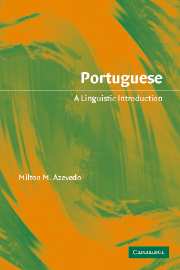Book contents
- Frontmatter
- Contents
- List of maps
- List of tables and figure
- Acknowledgments
- List of abbreviations and symbols
- Introduction
- 1 The Portuguese language in the world
- 2 Sounds
- 3 Words
- 4 Sentences
- 5 Portuguese in time
- 6 The expansion of European Portuguese
- 7 Brazilian Portuguese
- 8 Sociolinguistic issues
- Suggestions for further reading
- Glossary
- Bibliography
- Index
1 - The Portuguese language in the world
Published online by Cambridge University Press: 05 September 2012
- Frontmatter
- Contents
- List of maps
- List of tables and figure
- Acknowledgments
- List of abbreviations and symbols
- Introduction
- 1 The Portuguese language in the world
- 2 Sounds
- 3 Words
- 4 Sentences
- 5 Portuguese in time
- 6 The expansion of European Portuguese
- 7 Brazilian Portuguese
- 8 Sociolinguistic issues
- Suggestions for further reading
- Glossary
- Bibliography
- Index
Summary
On March 22, 2002, in Dili, the capital city of East Timor, a national constitution was enacted, whose Article 13 stated that “O tétum e o português são as línguas oficiais da República Democrática de Timor-Leste,” meaning ‘Tetum [a Southeast Asian language] and Portuguese are the official languages of the Democratic Republic of East Timor.’ A significant detail is that all the names and most of the surnames of the parliamentarians who signed the new constitution are Portuguese (Lourdes, Manuel, Maria, José, Luisa, Norberto, Costa, Martins, Silva, Alves, and so on), even though reportedly only about 2% of the population of East Timor speak Portuguese (Ethnologue.com 2002).
Having a constitution was a major accomplishment for that small country. After becoming independent in 1975 from Portugal, whose colony it had been since the fifteenth century, Timor was occupied by Indonesia for the next twenty-five years, and had to secure its freedom again at a heavy toll in human lives. Historically, however, this is just one more occasion on which Portuguese has served not only as a vital link to the outside world but also as a common language for speakers of East Timor's nineteen other languages, some of which, like Adabe or Habu, have only about one thousand speakers each. Portuguese has often played the role of a lingua franca° (a topic to be taken up again in Chapter 6) since the fifteenth century, when it began to spread from its birthplace in the Iberian Peninsula to reach the four courners of the earth.
- Type
- Chapter
- Information
- PortugueseA Linguistic Introduction, pp. 5 - 23Publisher: Cambridge University PressPrint publication year: 2005



